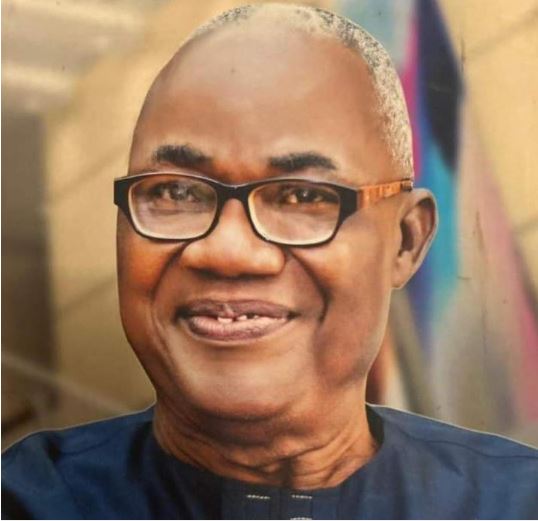

Akpo Esajere (1954-2024) exited not in the bloom of youth at 70, but his influence outdid his final deadline. His legacy grips memories and imaginations, binding hearts and minds, and making his transition at 70 premature. Esajere was not arrayed in the trappings of wealth or swathed in the cloak of widespread fame, but he was a curator of values, a pen luminary, a classicist of the political reporting genre, puritanical about scintillating prose, and a beacon of professional honour.
“Check the library”, he would say to the young reporter at inception, just so a fact can be double-checked. The Guardian newspaper library was reputed as a quintessential repository of all contemporary knowledge, especially around fleeting matters. “Go and check again, so that we can have all the angles”, he would instruct time and again, not only to validate cues but to boost a piece. “You are a reporter with calibre” he would hail, if it appears you have been checking and checking and getting weary “I believe in your ability to get it right and complete” .
Then watch him draft an introduction to a story. I mean that spellbinding or compelling initial few words to welcome the reader in advance of details. Akpo could devour tens of offcuts (the loose sheets for drafting stories in days gone by), trying to get it right. Head immersed in the paper, he could do a first, with just two words and ignore it. He will try again and discard if still underpar. Then he would try another and then another until it jelled. This time, he will read it to himself, but to the hearing of an adjunct, just to be sure. Then he will proceed to the remaining paragraphs.
When the story reaches the next processing line, the famed The Guardian sub desk, a hub of literary excellence, where celebrated copy conjurers, maestros, that included, at different times, Rasaq Adedigba, Banji Adisa, Kayode Idowu, Eziuche Ubani, Julius Omokioja Eto, etc, were in wait, Akpo Esajere’s “crafts” (as he used to call such drafts), were often assured of an easier pass. To be sure, this sub-desk then hallmarked The Guardian’s strength. It was a springboard around which the paper’s prose prowess rotated. Smart reporters could hone their skills by comparing their drafts, with what the desk eventually makes of it the day after.

Often the transformations were awesome. The difference was always clear. The doctoring was regularly impressive. While your byline sat beneath the headline, a chunk of the prose was not likely to be yours-just the facts, therein. The men at that desk were sacrificial writers, committed to the preservation of a glorious paper’s house style, a clearing house of a sort, but raising some subtle classroom questions on intellectual property, about content and ownership. In academia, the original writer will ideally have to submit, re-submit and re-submit again until s/he gets it right if to compare. In the newsroom, however, there is no luxury of time. A back-and-forth is not thoughtful. The newsroom is a rapid room. There is a frantic race to keep apace, and then the thankless job of the subeditors, even though the enthusiastic reporter is thankful.
But back to Akpo Esajere. “I am going to interview Lagbaja Tamodu tomorrow. So, I will be in the library if anyone is looking for me”. He will announce: “I now have enough on him. He has some explanations to give” he would say afterwards, with a wry smile. Then read the interview when published and you will behold rounds of penetrating questions, some epistemic peppering, sometimes theatrical, but able to force out as many facts as possible from the interviewee, for readers’ benefit as Esajere’s priority. “Be concerned about your reader. Don’t leave them in doubt. Provide as much verifiable information as possible and let them make up their mind”.
That’s Akpo, the essential interviewer, easily one of the best in the newspaper industry in his heydays. Then compare his pre-interview session library research to present times. He would have had all the details he needed about you beforehand. He is now simply approaching you for an update. These times, reporters begin the interview session by asking “May we meet (know) you?” Goodness! Excuse me! It should not even be the case in the 21st-century world of information and smart technology deluge, where you could check for details on the go, via the phone before the interview if the physical library is at a distance. But see!
I remember a presidential candidate strolling into The Guardian newsroom, asking to meet Akpo. “You have been interviewing everyone, but me. Why have you not looked for me?” It turned into a prickly scene. “Me! Interview you?” Akpo retorted between an exclamation and a question. The aspirant was yet to know what was ahead of him, so he dug in, unfortunately. “Yes, why not? Am I not a human being? Am I not contesting to be president? Do you think I don’t have money?” “Who told you we interview people because of money? And my friend, aspirants do not come to us for interviews, like you have done. We will find out if we think you are qualified. The Guardian is not cheap”, Akpo explained, but becoming impatient. “Are you saying I am cheap, or not worth your pages? I am better than many of those you have interviewed!” “Can you leave, please? You can see I am busy” “Leave for what? Interview me, I said!” The man responded.
Akpo sprang up and raced to the security section to call for the ejection of the interview-seeking obvious political tenderfoot. Somehow, inimitable title Editor, Eluem Emeka Izeze emerged from his office, and resolved the performance, permitting a subsequent post-mortem. “You see what I have been saying” Akpo began. “Some of these people just take us for granted. Interview just like that? On the pages of The Guardian? We cannot do that. Let him go elsewhere” Akpo was an epitome of the paper’s philosophy. He was integrity personified, elegant in deliveries and robust in portrayals. He never suffered fools gladly, and neither did he fail to nurture. He was respectful, respectable, and never owamberish in appearances at events. He chose events carefully, believing that not all materials were fit for the pages of the newspaper.
“Ensure you read new things, to vary your language” he will counsel again, just so your word power can be spicily pied. He was not just a journalist and writer, but a teacher, a motivator and an exemplar in a writhing of writers. “Biodun, I see you are now a professor,” he said in what turned out to be our last telephone conversation until we met at the bosom of the Lord. “Keep it up”, he added, further to his guiding spirit.
The edge death has over humanity shall forever remain mystifying. You know when you arrive, but not when you will depart and how. Looks unfair, but you are still helpless, regardless. You cannot change it. What sometimes matters is what you do between arrival and departure. But because you do not know the time of departure, man is better off putting in a best, every day, just in case. Akpo did his best, by being one of the best political journalists the nation has ever produced. The reason he will repeatedly be remembered as a first-rate writer, a sculptor of words, weaved into meanings, worthy enough to tickle, to tip-off the intellect, in the manner in which the mind will ever be appreciative. Akpo was a rock around political journalism literati. He will be missed. Bye-bye, Editor.
- Adeniyi, Professor of Communication, and Dean of the School of PostGraduate Studies, Baze University, Abuja, was a former The Guardian Political Correspondent.
Join Television Nigerian Whatsapp Now
Join Television Nigerian Facebook Now
Join Television Nigerian Twitter Now
Join Television Nigerian YouTUbe Now





